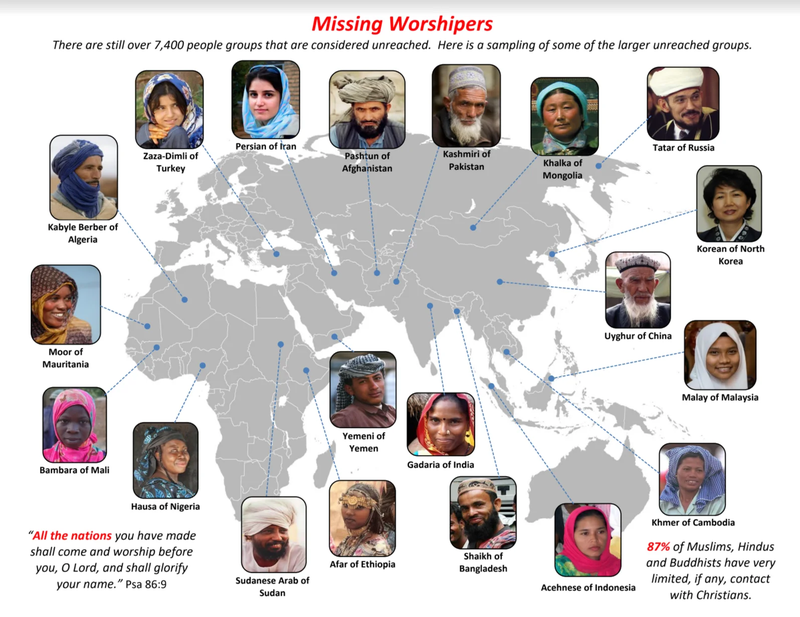· Christian Missions · 6 min read
Transform Your Mission Field Approach with 5 Cross-Cultural Evangelism Methods
Discover innovative cross-cultural evangelism strategies to enhance your mission field outreach. Explore 5 effective methods for sharing the gospel globally.

Transform Your Mission Field Approach with 5 Cross-Cultural Evangelism Methods
As a Christian seeking to share the gospel in cross-cultural settings, it is essential to have effective evangelism methods that can bridge the cultural divide and effectively communicate the message of Christ. In this article, we will explore five cross-cultural evangelism methods that can help you transform your mission field approach. These methods include contextualizing the gospel, asking lots of questions, engaging the culture through stories, being intentional, and abiding with Christ. By incorporating these methods into your evangelism efforts, you can better prepare for the mission field and effectively share the gospel across cultures.
1. How can you contextualize the gospel when sharing with cultures different from yours?
When sharing the gospel in a cross-cultural context, it is crucial to explain it in a way that makes sense within the cultural framework of the people you are reaching out to. This process is known as contextualization. Contextualization involves adapting the presentation of the gospel while maintaining its central message. By doing so, you can help people understand and connect with the message of Christ.
According to the North American Mission Board, contextualizing the gospel means explaining it in a way that makes sense within their cultural context while still keeping the core message intact. For example, you may need to use different analogies or illustrations that resonate with their cultural background. The goal is to make the gospel relevant and accessible to them without compromising its truth.
As Tim Keller, an influential Christian author and pastor, puts it: “Contextualization means giving people God’s answers (which they may not at all want or like) to questions about life that people in their particular time and place are asking, in language and forms they can comprehend, and through appeals and arguments with force they can feel.”
2. Why is asking lots of questions important when engaging in cross-cultural evangelism?
When engaging in cross-cultural evangelism, asking lots of questions is a crucial practice. By asking questions, you demonstrate genuine interest in the other person’s culture, beliefs, and experiences. This approach allows you to build relationships, gain insight into their worldview, and understand their needs and concerns.
According to an article from Gospel Fellowship, asking questions and listening to the answers is an essential part of effective evangelism. By listening attentively, you allow people to share their stories and beliefs, which can create a safe space for them to engage with the gospel. Additionally, asking questions that allow them to teach you something shows humility and respect for their cultural background.
By engaging in meaningful conversations and actively listening, you can create opportunities to share the gospel in ways that are relevant and meaningful to the people you are reaching out to. As you ask questions, seek to understand their perspectives, and show genuine care and empathy, you can effectively communicate the love of Christ.
3. How can engaging the culture through stories enhance cross-cultural evangelism?
Engaging the culture through stories is a powerful method for cross-cultural evangelism. Stories have a unique ability to transcend cultural barriers and connect with people on a personal and emotional level. By using storytelling as a tool for sharing the gospel, you can plant seeds of faith that resonate deeply with individuals from different cultural backgrounds.
In an article by TEAM (The Evangelical Alliance Mission), they highlight the effectiveness of storytelling in cross-cultural evangelism. Instead of relying solely on apologetic arguments or logical reasoning, telling the story of the gospel can be more impactful. This approach allows people to connect emotionally and engage with the narrative of God’s redemptive plan.
By using stories that are relatable to the culture you are reaching out to, you can make the message of Christ more accessible and understandable. Through storytelling, you can tap into universal themes of hope, redemption, and transformation that resonate with people’s deepest longings and desires.
4. Why is intentionality important in cross-cultural evangelism?
Intentionality is critical in cross-cultural evangelism. It involves purposefully and deliberately pursuing opportunities to share the gospel and build relationships with people from different cultures. Without intentionality, evangelism rarely happens spontaneously or effectively.
According to the International Mission Board (IMB), intentionality is crucial for effective cross-cultural disciple making. It requires a conscious effort to seek out opportunities, learn about different cultures, and adapt your approach to effectively communicate the gospel.
Being intentional means actively seeking to understand the cultural nuances, values, and beliefs of the people you are reaching out to. It involves taking the time to learn their language, engage in their customs, and build relationships based on trust and respect.
As Acts 16:13 reminds us, intentional evangelism often requires deliberate action: “On the Sabbath day we went outside the city gate to the river, where we expected to find a place of prayer.” The apostle Paul and his companions intentionally sought out a specific location where they believed they would find people open to hearing the gospel.
5. How does abiding with Christ contribute to effective cross-cultural evangelism?
Abiding with Christ is foundational for effective cross-cultural evangelism. It involves maintaining a deep and intimate relationship with Jesus through personal worship, prayer, Bible study, and meditation. This spiritual discipline provides the necessary strength, wisdom, and guidance needed for fruitful ministry in diverse cultural contexts.
In an article by Springs of Life Global Evangelistic Ministry, they emphasize the importance of abiding with Christ as a new missionary. Spending time with Jesus every day not only deepens your own faith but also equips you to be an effective ambassador for Christ in cross-cultural settings.
As you abide with Christ, you develop a heart that aligns with His mission and purposes. You gain a greater understanding of His love for all people and His desire to see them reconciled to Him. This intimate connection with Christ empowers you to approach cross-cultural evangelism with humility, compassion, and sensitivity.
Abiding with Christ also enables you to rely on the guidance of the Holy Spirit as you navigate cultural differences and challenges. The Holy Spirit equips and empowers believers to effectively communicate the gospel in ways that resonate with the hearts of those from different cultural backgrounds.
In conclusion, transforming your mission field approach with cross-cultural evangelism methods requires intentional effort. By contextualizing the gospel, asking lots of questions, engaging the culture through stories, being intentional, and abiding with Christ, you can effectively share the message of Christ across cultures. These methods allow you to bridge the cultural divide, build meaningful relationships, and communicate the love and truth of Jesus in ways that resonate deeply with diverse audiences. Remember to approach cross-cultural evangelism with humility, respect, and a genuine desire to understand and connect with people from different cultures.



